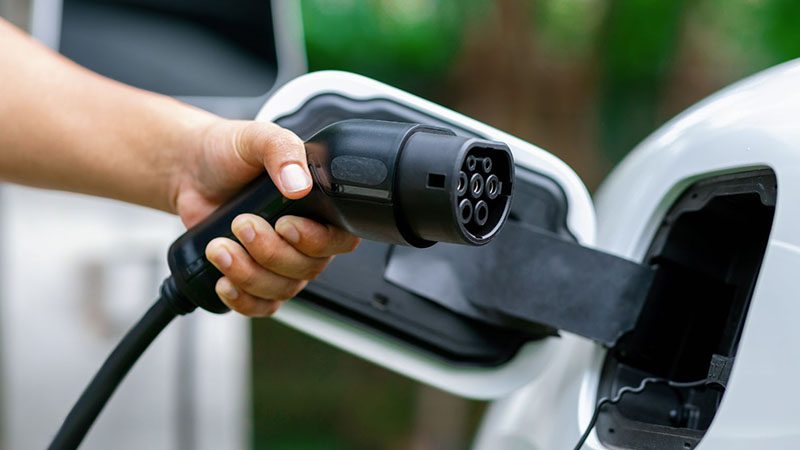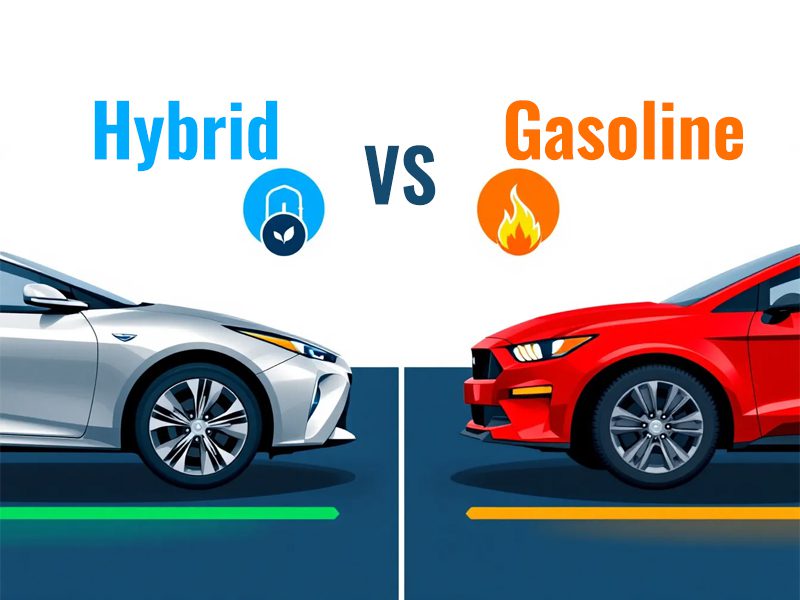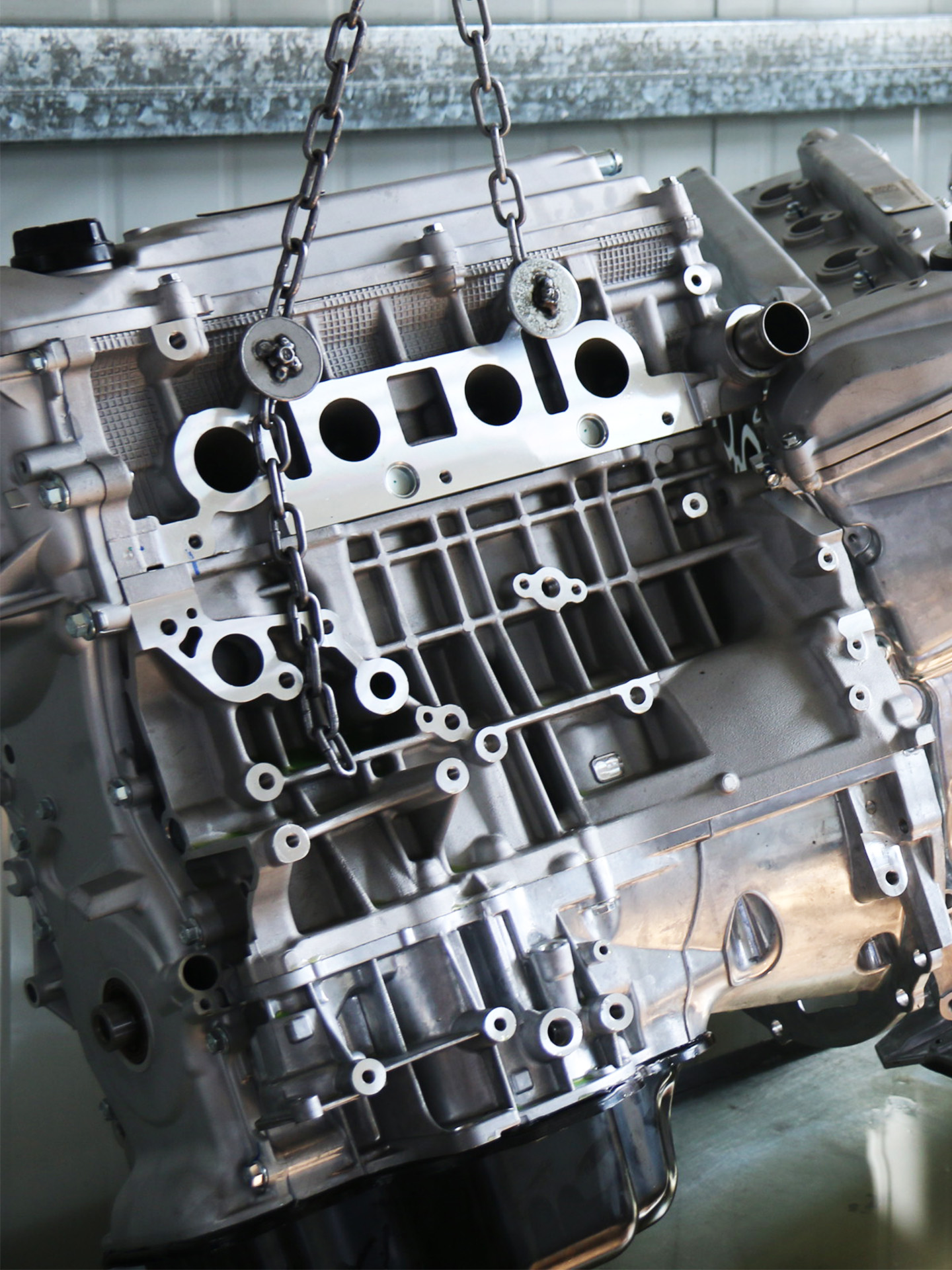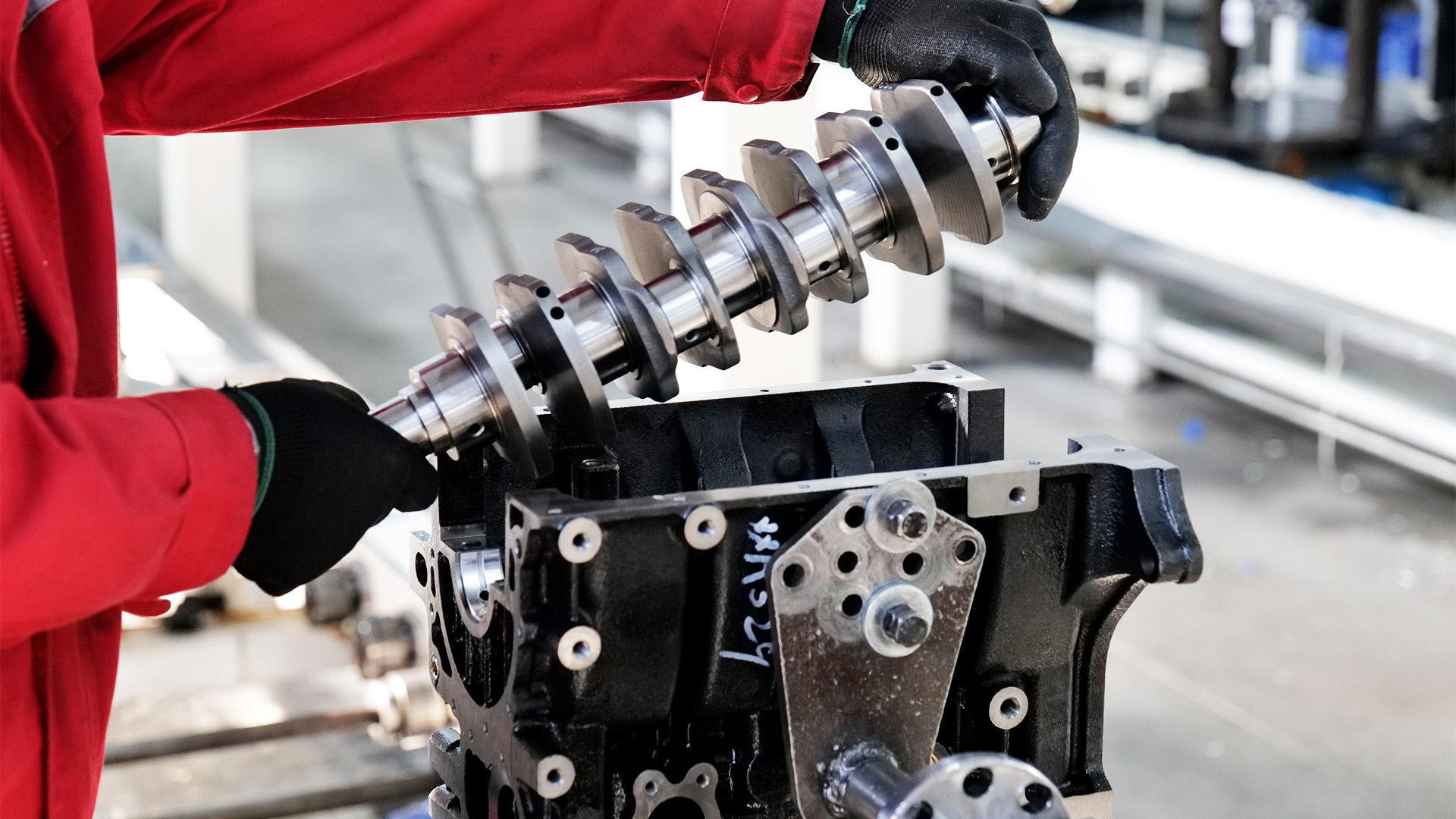Trying to decide between a hybrid vs gas vehicle? This article will dive into key areas like fuel efficiency, costs, and environmental impact to help you make an informed choice.
Key Takeaways
- Hybrid vehicles combine gas and electric power to be more fuel efficient, especially in urban driving conditions.
- While hybrids tend to have a higher upfront cost, they can lead to significant long-term savings on fuel and maintenance.
- Test driving both hybrid and gas models is essential to gauge their performance and find which fits your driving habits better.
Understanding Hybrid Vehicles

A hybrid car merges the capabilities of a conventional gasoline engine with an electric motor, enhancing fuel efficiency and curbing emissions. The gas engine in a hybrid vehicle functions as a crucial component, facilitating operations at higher speeds and during battery recharging.
Hybrids employ both an electric power source and a traditional internal combustion engine to dynamically adjust their performance in response to varying driving demands.
Through this fusion, hybrid vehicles consume less gasoline than standard cars, offering particular advantages during city commutes that involve frequent stops and starts.

Hybrid automobiles come in diverse forms, each boasting distinctive characteristics. Traditional full hybrids have the flexibility to alternate between utilizing electrical energy or gas propulsion independently or simultaneously for heightened efficiency.
Plug-in hybrids are equipped with more substantial batteries which support longer durations of pure electric operation but necessitate recharging from external sources.
Meanwhile, mild hybrids feature compact electrical systems designed primarily to boost the petrol engine’s effectiveness by providing supplementary power rather than enabling purely electric travel.
Hybrids are generally more fuel-efficient because they consume less gasoline, especially in urban environments where stop-and-go traffic is common.
Vehicles like the Toyota Prius excel in city driving by utilizing battery power to reduce fuel consumption. Understanding these key principles highlights how advanced engineering allows hybrids to adapt to different transportation needs efficiently.

Hybrid Vehicle Advantages
Hybrid vehicles offer several advantages over traditional gas-powered cars. One of the most significant benefits is their fuel efficiency. Hybrid cars combine a conventional engine with an electric motor, which provides improved fuel efficiency and reduced emissions.
This is achieved through regenerative braking, which captures waste energy and converts it into electricity to power the vehicle. Additionally, hybrid vehicles can apply power to save fuel or add power, depending on the manufacturer’s design and tuning.
Another advantage of hybrid vehicles is their lower environmental impact. Hybrid cars burn less fuel and produce fewer emissions than traditional gas-powered cars, making them a more environmentally friendly option.
Furthermore, hybrid vehicles are available in a wide range of shapes and sizes, from compact cars to luxury vehicles, making them a viable option for many drivers.
Comparing Fuel Efficiency

Hybrid vehicles are highly regarded for their fuel efficiency, with regenerative braking being a critical feature in enhancing this attribute.
This technology captures and stores as much as 70% of the kinetic energy usually lost during braking into the vehicle’s battery, substantially increasing its overall fuel economy.
When driving within city limits, hybrid cars have an edge due to superior miles per gallon performance, offering up to 30% more fuel efficiency than their traditional gasoline-powered counterparts.
Frequent stops and starts common in urban environments underscore why hybrids are ideal for drivers who frequently navigate congested areas.

The advantages of hybrid cars extend beyond urban travel scenarios. Although conventional gas vehicles may excel on extended highway excursions, hybrids demonstrate exceptional proficiency in intermittent traffic conditions by alternating between electric and gasoline power sources effortlessly.
Consequently, they consume less fuel across various driving situations, resulting in notable long-term savings at the pump.
Purchase Price and Depreciation
Typically, hybrid vehicles come with a higher purchase price compared to gas cars. However, the initial higher cost of a hybrid can be offset by long-term fuel savings and lower maintenance costs compared to a gas car.
The cost difference can amount to several thousand dollars between some hybrids and their gasoline-only models. For instance, even though opting for a new hybrid could result in substantial fuel savings over time, the steeper starting price may be off-putting for potential buyers.
In contrast, gas-powered cars tend to have a more affordable upfront cost which appeals to a wider audience of consumers. Nevertheless, it’s important to note that the rate at which hybrids depreciate might differ considerably depending on the model in question.
High-end luxury hybrids often see swift depreciation due to lofty initial prices whereas conventional models such as the Toyota Camry Hybrid typically depreciate around 25% after three years.

Assessing these financial factors is essential when choosing between hybrid and traditional gasoline-fueled vehicles. Although you’re likely to save money on fuel costs with a hybrid over time, evaluating both the immediate cost outlay and anticipated value depreciation remains key during your decision-making process.
Fuel Costs and Savings
Opting for a hybrid vehicle instead of a conventional gas model can lead to notable savings on fuel. In contrast, a gas only car may have lower upfront costs but higher fuel expenses over time.
Typically, one might expect an annual reduction in fuel costs around $395 when driving a hybrid. These financial benefits are subject to change based on personal driving behavior, specifically whether your travels take you primarily through city streets or along highways.
The cost-effectiveness of hybrids becomes more apparent as their enhanced efficiency begins to offset the steeper purchase price associated with them.

In urban environments where stop-and-go traffic is common, the superior fuel economy offered by a hybrid could result in significant monetary gains over time. This aspect renders hybrids particularly appealing for those intent on reducing long-term expenditures on gasoline.
Nevertheless, it’s critical to assess how and where you drive before projecting the possible financial advantages of owning a hybrid.
While these vehicles are celebrated for their remarkable efficiency regarding fuel consumption, actual cost savings will vary depending upon individual driving patterns and conditions faced regularly.
For numerous consumers, the potential reductions in ongoing fuelling expenses justify investing more initially into acquiring a hybrid car.
Maintenance and Repairs

Hybrid vehicles often incur lower maintenance costs compared to traditional gasoline cars, largely due to their regenerative braking systems and a reduced number of mechanical components.
On average, the yearly upkeep cost for hybrid vehicles is around $600, making it quite cost-effective. The routine servicing required for hybrids mirrors that of gasoline-powered cars and typically includes oil changes and brake replacements.
However, a gas only vehicle may require more frequent maintenance checks and higher repair costs over time.
Nevertheless, one must take into account the significant expense related to battery replacement. Hybrid vehicle high-voltage batteries are dependable but may come with a steep price tag once they’re out of warranty coverage.
In extreme cases, replacing an aged vehicle’s battery could even surpass its current market value. Yet on the whole, hybrids tend to exhibit fewer issues than gas-driven counterparts by about 26%.

The wear on standard braking systems tends to be lessened in hybrid vehicles thanks to their utilization of regenerative braking technology—this can lead not only to reduced frequency but potentially also decreased repair expenditures over time.
Despite fuel savings being a clear advantage with hybrids, it’s crucial when evaluating such vehicles also consider these various maintenance and repair expenses which might balance out those initial savings from fuel economy gains.
Insurance and Durability
Hybrid vehicles are generally more expensive to insure than traditional gas-powered cars. However, the cost of insurance can vary depending on several factors, including the driver’s location, driving record, and the specific model of the vehicle.

Some insurance companies offer discounts for hybrid vehicles, which can help offset the higher cost of insurance.
In terms of durability, hybrid vehicles are designed to be reliable and long-lasting. The electric motor and battery pack in hybrid vehicles are designed to work together seamlessly, providing a smooth and efficient driving experience.
Additionally, hybrid vehicles often have lower maintenance costs than traditional gas-powered cars, as they have fewer moving parts and are less prone to wear and tear.
Overall, hybrid vehicles offer several advantages over traditional gas-powered cars, including improved fuel efficiency, lower environmental impact, and lower maintenance costs. While they may be more expensive to insure, the benefits of hybrid vehicles make them a viable option for many drivers.
Environmental Impact
Hybrid vehicles provide a number of ecological advantages, including diminished emissions from the tailpipe when compared to conventional gasoline-powered cars.
Electric vehicles, on the other hand, produce zero tailpipe emissions, making them an even more environmentally friendly option.

These hybrids release fewer noxious substances into the atmosphere, leading to better air quality and fostering a more healthful living environment. This decrease in pollutant discharge is particularly beneficial for densely populated urban centers struggling with severe smog conditions.
Hybrid automobiles produce less carbon dioxide, aiding in alleviating their contribution to climate change. The reduced noise levels emanating from hybrid engines also contribute to lower sound pollution levels—another aspect that underscores their status as eco-conscious transportation alternatives.
Highlighting fuel efficiency as crucial in minimizing environmental impact is essential. Hybrid cars are designed for optimal fuel economy by consuming lesser quantities of petroleum-based fuels, which curtails the overall reliance on non-renewable energy resources and paves the way towards sustainable development practices.
For those valuing ecological preservation highly, investing in a hybrid vehicle can serve as an effective strategy for enhancing fuel efficiency while addressing environmental concerns concurrently.
Driving Experience

The experience of driving hybrid vehicles as opposed to traditional gas-powered cars can vary substantially. Hybrids, with their electric elements, often deliver prompt acceleration and may surpass the performance of conventional gas vehicles under certain conditions on the road.
The gas engine in hybrids provides additional power when needed, ensuring a smooth and responsive driving experience. The switch from electric to gasoline power in a hybrid typically occurs smoothly and is barely perceived by drivers.
Conversely, standard gas-powered automobiles provide superior efficiency and performance during extensive highway drives where maintaining a constant velocity is common.
They might also be more exciting for motorists navigating through highways or rural routes due to their design attributes. It’s important to take into account the comfort level and practicality offered by each vehicle’s interior arrangement since hybrids tend to feature distinct layouts when compared with their gasoline counterparts.
In scenarios that involve recurrent stopping and starting such as city traffic, hybrids prove particularly advantageous thanks largely to this aspect of their design offering effective use of fuel in these situations.
When deciding between a hybrid or traditional gasoline model, one should carefully evaluate distinctions in acceleration capabilities, handling dynamics, and overall vehicular performance.
Long-Term Ownership Costs

Ownership costs for vehicles encompass a variety of expenses, such as financing charges, registration fees, inspection costs, acquisition price, maintenance expenditures, fuel prices, and insurance premiums.
Although hybrid vehicles typically come with a higher upfront cost compared to their gasoline counterparts, they can offer considerable savings in terms of fuel over time.
In contrast, a gas only vehicle may have lower initial costs but higher long-term fuel and maintenance expenses. Depending on the vehicle’s fuel efficiency levels, it’s possible for owners to recover the additional investment made in a hybrid within just 2.5 years.
Taking the Kia Sorento Hybrid as an example: Over a span of ten years, its ownership would amount to $55,662 whereas an exclusively gas-powered Kia Sorento incurs $56491 during the same period.

This comparison indicates that hybrids might provide marginal overall savings owing primarily to lower fuel consumption and reduced maintenance outlays despite having higher average full coverage insurance rates—$2140 for hybrids like the Sorento versus only $2000 for traditional gas-fueled models.
Weighing these long-term financial commitments is vital when choosing between purchasing a hybrid or purely gasoline-driven automobile. The initial expense incurred by acquiring a hybrid may exceed that of standard vehicles.
Considering eventual cost-effectiveness due to diminished operating expenses could justify opting for hybrids as well strategically sound decision making option when contemplating future investments into personal modes of transportation.
Ideal Use Cases
Hybrids are particularly adept at navigating city streets because they can run more efficiently at lower speeds. The stop-and-go traffic common in urban areas is where hybrids shine by reducing fuel costs and utilizing regenerative braking effectively, thus presenting a compelling option for those living in cities.

Conversely, vehicles powered solely by gas may offer superior benefits while cruising on highways or rural routes. A gas only car is often preferred for long-distance travel due to its consistent performance and fuel efficiency on highways.
These cars provide heightened performance and an engaging experience for the driver under such conditions. During extended drives on highways, gasoline-powered vehicles often maintain better fuel efficiency and reliable performance.
Self-charging hybrid models use their own gasoline engine to replenish the battery power, which is especially convenient for drivers who lack easy access to charging facilities. Recognizing these optimal scenarios can aid in selecting the vehicle type that aligns best with your driving habits and requirements.
Test Drive Recommendations
When contemplating the purchase of a new car, it’s imperative to take both hybrid and traditional gas-fueled models out for test drives in order to directly compare their distinctive qualities.

This is especially important for potential hybrid owners to understand the unique driving dynamics and benefits of hybrid technology. Pay particular attention to how smoothly hybrids transition between electric and gasoline power during operation, as this aspect can greatly influence your overall driving satisfaction.
Hybrid cars often come equipped with regenerative braking systems designed to improve battery efficiency. It’s beneficial to explore various driving modes that these vehicles may offer, such as eco or sport settings, which allow you to gauge changes in performance from being more fuel-conservative up through enhanced dynamic response.
By personally testing each kind of vehicle, you gain deeper insight into what each has to offer and are better positioned to determine which one meets your individual preferences and requirements. Firsthand experience is invaluable when deciding on the nuances that will guide your choice.
Conclusion
To summarize, hybrid vehicles excel in fuel efficiency, reducing emissions and sometimes lowering certain maintenance expenses. They usually carry a heftier purchase price and might necessitate costly battery replacements down the line.

In contrast, gas-powered vehicles are often favored for their highway driving performance and more affordable upfront costs, but can lead to increased expenditures on fuel and upkeep as time goes by.
The choice between a hybrid or a gas vehicle is heavily influenced by your personal driving patterns, ecological considerations, and economic objectives for the future.
If your daily commute involves city driving with numerous stops, opting for a hybrid may be advantageous. While those who frequently travel long distances on highways could find that a traditional gasoline vehicle better fits their needs.
When making this decision, it’s essential to weigh the initial investment against potential savings and performance expectations.
Whether you choose a gas or hybrid vehicle, maintaining your car’s engine and keeping it in optimal condition is always essential.
At Nanjing Woda Auto Technology Co., Ltd., we specialize in high-quality OEM and aftermarket engine parts, ensuring your vehicle—whether hybrid or gas-powered—operates at peak efficiency.
If you’re looking for reliable, performance-driven auto parts, contact us now to explore our offerings and find the perfect solution for your automotive needs.

Frequently Asked Questions
How much can I save on fuel with a hybrid vehicle?
You can save about $395 a year on fuel by choosing a hybrid vehicle, but this varies based on your driving habits and conditions. Hybrid vehicles are more fuel efficient, especially in city driving conditions, which contributes to these savings.
It’s a smart choice if you’re looking to cut fuel costs!
Are maintenance costs higher for hybrid vehicles?
Maintenance costs for hybrid vehicles are generally lower because they have fewer moving parts and use regenerative braking, but you should be aware that battery replacements can be a significant expense.
In contrast, a gas only vehicle may require more frequent maintenance checks and higher repair costs over time.
What is the environmental impact of hybrid vehicles?
Hybrid vehicles significantly reduce tailpipe emissions and contribute to improved air quality while minimizing noise pollution. Electric vehicles, on the other hand, produce zero tailpipe emissions, making them an even more environmentally friendly option.
This makes them a more environmentally friendly option compared to traditional gas-powered vehicles.
How does the driving experience differ between hybrid and gas vehicles?
Hybrid vehicles deliver quicker acceleration and smooth transitions between electric and gas power, making city driving enjoyable, whereas gas vehicles tend to excel in performance during long highway trips. The gas engine in hybrids provides additional power when needed, ensuring a smooth and responsive driving experience.
So, it really depends on your driving needs!
What are the long-term ownership costs of hybrid vs. gas vehicles?
Long-term ownership of hybrid vehicles can save you money on fuel and maintenance despite their higher initial cost. In contrast, a gas only car may have lower initial costs but higher long-term fuel and maintenance expenses.
Over time, these savings often balance out, making hybrids a financially smart choice.






